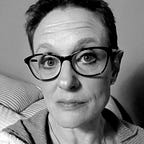I’m Used to It
How I’m treated differently as a woman in a man’s world
I walk into the Crop Production Clinic, a day of talks centering around agriculture presented by our University’s Extension staff. I know what to expect for the day. First, when I go to sit down in the lecture room, I will get men glancing at me from the corner of their eyes, and no one will sit in the chairs next to me. They will not chitchat with me, not smile, and I will be ignored for most of the morning, if not the whole day. I will, however, also not have to wait in line at the bathroom. When meeting someone for the first time in my profession, or when talking with many of my clients, the majority of them do not reach out to shake my hand.
Am I disfigured? Am I rude? Have I forgotten my deodorant? Why do people in my profession give me a wide berth, as if I have a strange disease?
It’s not from my resting bitch face. It’s because I’m a woman in a man’s world. Agriculture is dominated by men, and us women who dabble in their world are still treated differently. I don’t think they dislike me — I think they frankly don’t know what to do with me. I’m a woman — shouldn’t I be in a more feminine career path? Should they bow instead of shaking my hand? Will I interpret any physical touch as something more than platonic? What would their wives say if they found out they had actually sat with another woman? If they talked to me, would it be flirting? Some of this sounds absolutely absurd, but it is something I deal with daily in my line of work.
I’m treated differently. Is it okay? I don’t know, but the sad thing is that I’m used to it. You would think that, after 25 years of being in agronomy, more men would be used to the feeling of sharing their work with a woman, but it just isn’t the case. And it’s usually the young men who are the most awkward, strange to say. Perhaps after many decades, the older men have seen about anything, so they are more able to roll with the punches, so to say. Perhaps the younger men haven’t learned how to put gender and sexual tensions aside and treat people as just people.
How have I adapted? When in Rome, they say…..so I wear less feminine clothes when in my profession. I wear t-shirts, jeans, ball caps, my grandpa’s shirts. I cover up more completely, and forgo “the lace” when possible. Anything that might remind them of my femininity, I avoid when working. Should I have to do this? No. But I still do. I was at a banquet once, wearing a dress with my hair down (I had long hair at the time), and a client of mine didn’t even recognize me — that’s how much I avoid femininity in the workplace. It’s not because I don’t like being pretty or showing a little skin (even my shoulders, people) — it’s because men feel more comfortable talking to me about agriculture, and they seem to respect my opinion more when I’m dressed in a masculine manner. Why is it that I appear to know what I’m talking about when dressed like a man, and not a woman? I have to hide my gender to be respected in this profession — it’s just the way it is.
What’s the solution? First, why are we so obsessed with labeling something as being “man’s work” or “women’s work”? Why can’t we take the gender out of things, and just call it “people’s work”? Not everything has to be based on what is in between our legs, or on our chest. Not every interaction between a man and a woman has to be judged on its sexual nature — we’re people first, can’t we just leave it at that? Can’t a person know what they are talking about because of their brain and experience, and not because of how they happen to be born? I believe if we listen first and judge later, we’d be better off in this world. Never assume — I’ve learned that by being the minority in the room several times.
Someone shouldn’t be used to being treated as less than they are, or ignored for looking different, or discounted for being born an alternate way from what society considers the norm.
There is no normal. I haven’t met a normal person, once I get to know them. Each person I meet I can find something that makes them unique from the common crowd — and something that connects them to me, somehow. We are all unique, and that’s what makes us all the same.
I think it’s time to celebrate that.
So the next time you see me sitting alone in one of those agriculture conferences, please don’t let me sit alone — come and talk to me. Offer me a coffee. Ask me how my day is going. You just might find we have something in common. And you might make a new friend.
Tansy Julie Soaring Eagle Paschold
August 15, 2020
